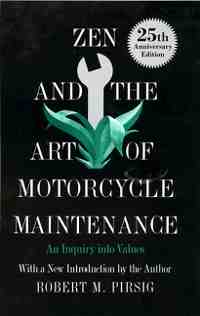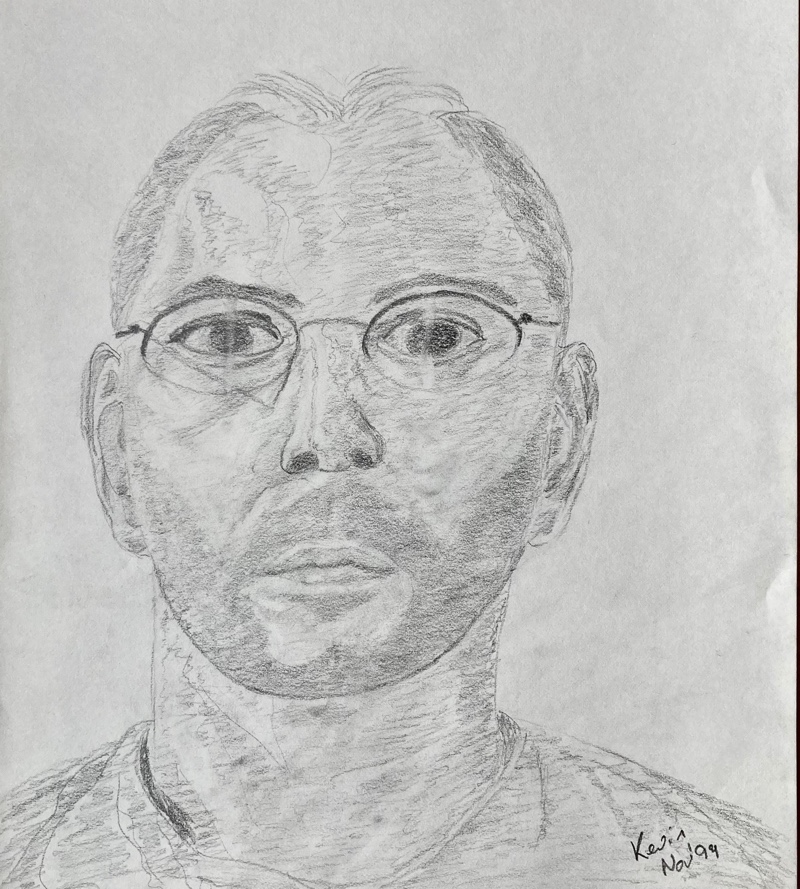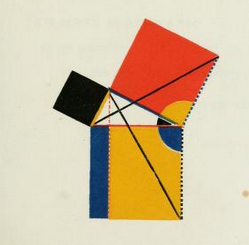I think I might be a dualist
I’ve been interested in philosophy since reading Zen and the Art of Motorcycle Maintenance all those years ago but, after dozens of philosophy books, I still feel like a perpetual beginner. I decided it’s time to study it a bit more seriously and see if I can’t make some progress. I’ve started a philosophy degree with the Open University.
I have a bunch of ideas in my head about how the world works and what it all means and I thought it’d be fun to write some of them down before I get all my naive habits and beliefs tutored out of me. I’ll come back and read them later once I’m educated to see if they were any good — a bit like when they make you draw a self-portrait in your first drawing class and make you compare it to the portrait that you draw in the final class. I expect Future Me will find Current Me cute but silly.
Here goes for the first one: I think I might be a dualist.
Dualism is the idea that there are two different kinds of stuff in the world. There is material stuff — the stuff you can poke and prod and pour — and another kind of stuff. What the other stuff is depends on what kind of dualist you are.
Dualism is often associated with René Descartes who believed that we consist of a material body and an immaterial mind. In Cartesian dualism, the immaterial mind is the “real me” that does all the thinking, hoping and believing and is associated with a material body only for the duration of our brief, mortal life. According to Descartes, the material body and the immaterial mind are made from different substances. For this reason, Cartesian dualism is often referred to as a kind of substance dualism.
Cartesian dualism was the prevailing belief in the West for a couple of hundred years and similar beliefs still dominate in other parts of the world. Cartesian mind-stuff has often been associated with supernatural ideas like spirits and the Christian soul. But dualism began to fall out of fashion as philosophers began to reject theistic accounts of the world and scientists gave more complete accounts of the brain that did not require this second, immaterial substance.

The leading alternative to this two-substance account of the world is physicalism. For a physicalist, everything can be explained in terms of physical objects and the physical laws that they obey. Physicalism used to be called materialism but the latter fell out of fashion for what seem to me to be pedantic reasons but now, at least, physicalists are not confused with those materialists who are driven by a desire for wealth and possessions. Totally different people.
I happened to ask my tutor how physicalists think of non-physical ideas like Pythagoras’s theory or Super Mario World or Beethoven’s Fifth Symphony. Are they physical? I expected a yes/no answer but instead I got a 2000-word email that said, more or less, it depends. The Stanford Encyclopedia of Philosophy was not much more help. Its 16,815 words on physicalism said, more or less, that opinions vary.
One account has it that anything that is physical or is caused by something physical or — jargon alert — supervenes on something physical is also physical (complaint: philosophy seems to have a lot more jargon than is strictly necessary). By this account, Beethoven’s Fifth is physical — which seems nuts to me.
I wonder if the folks who are committed to the idea that Beethoven’s Fifth is physical are influenced by a lingering distaste for the association between dualism and supernatural concepts like spirits and souls and resist the idea of a second category for that reason. I understand the idea that entities should not be multiplied beyond necessity and, sure, the argument that ideas and information can be physical because they are caused by physical things seems correct but it doesn’t seem very useful to have a single category of things that includes both orchestras and the music that they play. They seem like fundamentally different kinds of thing to me.
My tutor suggested that thinking about Beethoven’s Fifth just confuses things. I can make philosophical progress by just thinking about ‘Middle C’ and what that is. Beethoven’s Fifth is just more of the same. That doesn’t seem right to me either though. ‘Middle C’ is the name that we give to a particular frequency of sound; it’s just our name for something that exists in the physical world. Beethoven’s Fifth is not like that. Beethoven’s Fifth exists in the pattern of sounds created by an orchestra or in the pattern of indentations in a compact disk. It can also exist as a series of markings on a page of sheet music. It seems to exist in all those mediums and yet independently of any one of them. It once existed in the mind of Beethoven and, before that, it didn’t exist at all.
The Stanford Encyclopedia talks about the distinction between physical objects and abstract objects but focusses on the example of 7+5=12. Again, that seems like a different kind of thing from Beethoven’s Fifth. 7+5=12, according to one account, has been true since the beginning of time — it’s more like a physical law. But that phrase dah-dah-dah-daaaah did not exist until Beethoven banged it out on his piano. Also, 7+5=12 can be true or false, like a proposition. Can Beethoven’s Fifth be true or false? Is it a proposition? I don’t think so.
The Stanford Encyclopedia goes on to say that if 7+5=12 is not a physical object, or a fact about physical objects or a relation between physical objects or one of eleventy other ways of saying it derives from physical things then physicalism is false. That doesn’t sound right to me either. I mean, maybe 7+5=12 is a fact about physical objects but Beethoven’s Fifth is not. I don’t want physicalism to be false — it’s a useful theory — but I’d like some other category to put symphonies and video games in to separate them from oak trees and jumbo jets.
Stanford also allows that we might be able to save physicalism by restricting the definition to include only objects, or properties of objects, that are grounded in the physical world.
Physicalism is true at a possible world w iff every groundable property instantiated at w is either a physical property or is grounded in a physical property.
[Stanford suggests that this definition might come from ‘Fundamentality physicalism, Inquiry‘ by Gabriel Oak Rabin (2020) but the cite is not clear and I don’t have access to the original paper. I hope I am not misrepresenting it.]
Grounding physicalism allows for some objects or properties of objects that are not physical without throwing out the concept of physicalism. Hooray for physicalism, I guess. It seems to me, however, that grounding physicalism opens up a hole big enough to sneak spirits and souls back in but still doesn’t give me a place to put my symphonies. Chomsky says the whole project of trying to apply physicalism to mental concepts is misguided. This sounds right to me but I’ll save that argument for another day.
I think where I’ve ended up is that physicalism is a good and sufficient explanation for objects and events and processes in the physical world but that Beethoven’s Fifth does not exist in the physical world. Symphonies are not physical and the laws of physics are not useful in explaining them. We need another category. The Stanford Encyclopedia suggests several ways of describing this arrangement but most of them seem to me to be more committed to saving physicalism than in providing a useful category for describing ideas and information. Property Dualism sounds closest to what I have in mind so I’ll go with that for now. Property dualism says that there’s only one fundamental kind of thing in the world but things of that kind have two different kinds of properties: physical properties (size, shape, position etc) and mental properties (properties that only exist in minds — though I want to argue later that symphonies can exist outside of minds too).
So, dualism then. What are the consequences of my new worldview?
I think the most important thing I’ve learned from this episode is that dualism doesn’t necessarily entail supernatural entities and that I can still wear my Brights badge with pride.
I think I’m also committed to the idea that there is value in thinking of the mind as analogous to software (brain is to mind as hardware is to software) and I’ll write more about that another day (update: I wrote about it here).
I need to revisit David Chalmer’s argument about the Hard Problem of Consciousness and Frank Jackson’s Knowledge Argument now that I understand that Chalmers and Jackson are not arguing for souls and spirits. I still think they are wrong but they are not wrong for the reasons that I thought before.
Introduction
I’m learning to write philosophy essays and both of my tutors have made it very clear that philosophy essays need to have an introduction that summarises everything you are going to say in the essay proper. However, this is a blog post and not an essay and I’m still committed to the idea that it’s better to have the big reveal at the end instead of giving everything away at the start. Maybe I’ll change my mind on that or have it beaten out of me but I am not there yet. You have to read to the end to find out what I think. No numbering my paragraphs or references either. Sorry. Follow the links if you want to know more about something.
A Funny Story about Introductions
I completed my first module recently. Each module has a bunch of assignments that are graded and returned with a bunch of feedback. My first tutor wrote feedback in the Word doc that contained my essay. My tutor for my second module didn’t do this and I got really confused and hunted frantically for my feedback.
So, you know how when non-techies send you a zip file and there are all sorts of random files and attachments that just kind of get swept up in the zip? There’s always a LOGO.JPG and a weird little text file with a copyright notice along with the actual document that they wanted to send. Sometimes there’s an HTML file with a gobbledegook name and some corporate nonsense in it. When I couldn’t find any feedback from tutor number two, I searched all the files one last time and found that the corporate nonsense file actually contained all my tutor’s feedback.
“Hmmm…” I thought and went back to re-open all the zips from tutor number one. Sure enough, all the HTML files were full to the brim with comprehensive and very useful feedback that I had never seen before! I had essentially been working for six months with practically no feedback!
Tutor number two said that my grade on my first assignment would have been better if I had written a more comprehensive introduction. It turns out that tutor number one had said the same thing on four different assignments but I didn’t see it because I had never read his feedback. Oh well. Live and learn.





